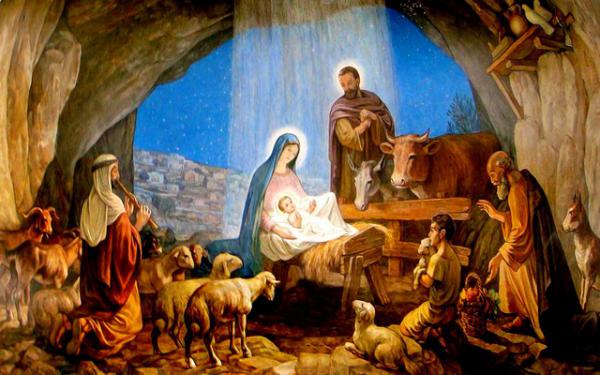Our Lord Jesus Christ, the Savior of the world, was born of the Most Holy Virgin Mary in the city of Bethlehem during the reign of the emperor Augustus (Octavian). Caesar Augustus decreed that a universal census be made throughout his Empire, which then also included Palestinian Israel. The Jews were accustomed to be counted in the city from where their family came. The Most Holy Virgin and the Righteous Joseph, since they were descended from the house and lineage of King David, had to go to Bethlehem to be counted and taxed. In Bethlehem they found no room at any of the city's inns. Thus, the God-Man, the Savior of the world, was born in a cave that was used as a stable. Having given birth to the divine Infant without travail, the Most Holy Virgin "wrapped Him in swaddling clothes, and laid Him in a manger" (Luke 2:7). In the stillness of midnight (Wisdom of Solomon 18:14-15), the proclamation of the birth of the Savior of the world was heard by three shepherds watching their flocks by night. The present Feast, commemorating the Nativity in the flesh of our Lord Jesus Christ, was established by the Church. Its origin goes back to the time of the Apostles. In the Apostolic Constitutions (Section 3, 13) it says, "Brethren, observe the feastdays; and first of all the Birth of Christ, which you are to celebrate on the twenty-fifth day of the ninth month." In another place it also says, "Celebrate the day of the Nativity of Christ, on which unseen grace is given man by the birth of the Word of God from the Virgin Mary for the salvation of the world." In the second century St Clement of Alexandria also indicates that the day of the Nativity of Christ is December 25. In the third century St Hippolytus of Rome mentions the Feast of the Nativity of Christ, and appoints the Gospel readings for this day from the opening chapters of St Matthew. During the first three centuries, in the Churches of Jerusalem, Antioch, Alexandria and Cyprus, the Nativity of Christ was combined together with the Feast of His Baptism on January 6, and called "Theophany" ("Manifestation of God"). This was because of a belief that Christ was baptized on anniversary of His birth, which may be inferred from St John Chrysostom's sermon on the Nativity of Christ: "it is not the day on which Christ was born which is called Theophany, but rather that day on which He was baptized." The Nativity of Christ has long been counted as one of the Twelve Great Feasts. It is one of the greatest, most joyful and wondrous events in the history of the world.
Source:Church Calender

